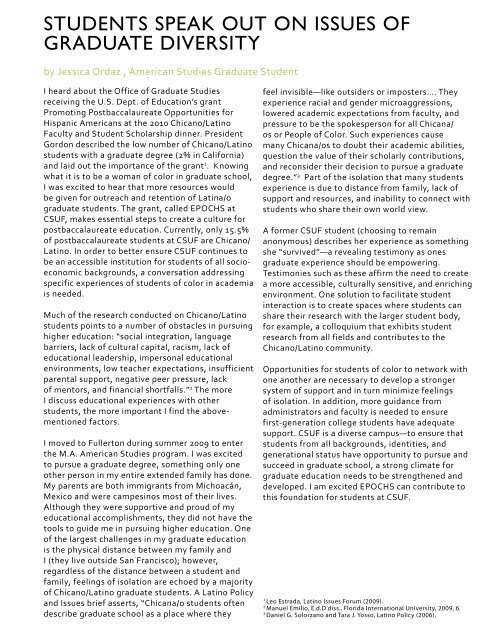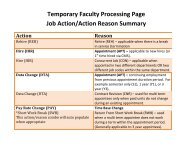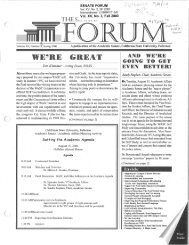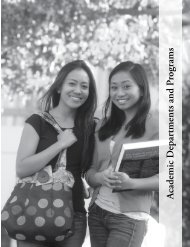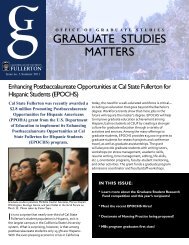GRADUATE sTUDiEs mATTERs - California State University, Fullerton
GRADUATE sTUDiEs mATTERs - California State University, Fullerton
GRADUATE sTUDiEs mATTERs - California State University, Fullerton
You also want an ePaper? Increase the reach of your titles
YUMPU automatically turns print PDFs into web optimized ePapers that Google loves.
sTUDENTs sPEAK OUT ON issUEs OF<br />
<strong>GRADUATE</strong> DiVERsiTy<br />
by Jessica Ordaz , American Studies Graduate Student<br />
I heard about the Office of Graduate Studies<br />
receiving the U.S. Dept. of Education’s grant<br />
Promoting Postbaccalaureate Opportunities for<br />
Hispanic Americans at the 2010 Chicano/Latino<br />
Faculty and Student Scholarship dinner. President<br />
Gordon described the low number of Chicano/Latino<br />
students with a graduate degree (2% in <strong>California</strong>)<br />
and laid out the importance of the grant 1 . Knowing<br />
what it is to be a woman of color in graduate school,<br />
I was excited to hear that more resources would<br />
be given for outreach and retention of Latina/o<br />
graduate students. The grant, called EPOCHS at<br />
CSUF, makes essential steps to create a culture for<br />
postbaccalaureate education. Currently, only 15.5%<br />
of postbaccalaureate students at CSUF are Chicano/<br />
Latino. In order to better ensure CSUF continues to<br />
be an accessible institution for students of all socioeconomic<br />
backgrounds, a conversation addressing<br />
specific experiences of students of color in academia<br />
is needed.<br />
Much of the research conducted on Chicano/Latino<br />
students points to a number of obstacles in pursuing<br />
higher education: “social integration, language<br />
barriers, lack of cultural capital, racism, lack of<br />
educational leadership, impersonal educational<br />
environments, low teacher expectations, insufficient<br />
parental support, negative peer pressure, lack<br />
of mentors, and financial shortfalls.” 2 The more<br />
I discuss educational experiences with other<br />
students, the more important I find the abovementioned<br />
factors.<br />
I moved to <strong>Fullerton</strong> during summer 2009 to enter<br />
the M.A. American Studies program. I was excited<br />
to pursue a graduate degree, something only one<br />
other person in my entire extended family has done.<br />
My parents are both immigrants from Michoacán,<br />
Mexico and were campesinos most of their lives.<br />
Although they were supportive and proud of my<br />
educational accomplishments, they did not have the<br />
tools to guide me in pursuing higher education. One<br />
of the largest challenges in my graduate education<br />
is the physical distance between my family and<br />
I (they live outside San Francisco); however,<br />
regardless of the distance between a student and<br />
family, feelings of isolation are echoed by a majority<br />
of Chicano/Latino graduate students. A Latino Policy<br />
and Issues brief asserts, “Chicana/o students often<br />
describe graduate school as a place where they<br />
feel invisible—like outsiders or imposters…. They<br />
experience racial and gender microaggressions,<br />
lowered academic expectations from faculty, and<br />
pressure to be the spokesperson for all Chicana/<br />
os or People of Color. Such experiences cause<br />
many Chicana/os to doubt their academic abilities,<br />
question the value of their scholarly contributions,<br />
and reconsider their decision to pursue a graduate<br />
degree.” 3 Part of the isolation that many students<br />
experience is due to distance from family, lack of<br />
support and resources, and inability to connect with<br />
students who share their own world view.<br />
A former CSUF student (choosing to remain<br />
anonymous) describes her experience as something<br />
she “survived”—a revealing testimony as ones<br />
graduate experience should be empowering.<br />
Testimonies such as these affirm the need to create<br />
a more accessible, culturally sensitive, and enriching<br />
environment. One solution to facilitate student<br />
interaction is to create spaces where students can<br />
share their research with the larger student body,<br />
for example, a colloquium that exhibits student<br />
research from all fields and contributes to the<br />
Chicano/Latino community.<br />
Opportunities for students of color to network with<br />
one another are necessary to develop a stronger<br />
system of support and in turn minimize feelings<br />
of isolation. In addition, more guidance from<br />
administrators and faculty is needed to ensure<br />
first-generation college students have adequate<br />
support. CSUF is a diverse campus—to ensure that<br />
students from all backgrounds, identities, and<br />
generational status have opportunity to pursue and<br />
succeed in graduate school, a strong climate for<br />
graduate education needs to be strengthened and<br />
developed. I am excited EPOCHS can contribute to<br />
this foundation for students at CSUF.<br />
1 Leo Estrada, Latino Issues Forum (2009).<br />
2 Manuel Emilio, E.d.D diss., Florida International <strong>University</strong>, 2009, 6.<br />
3 Daniel G. Solorzano and Tara J. Yosso, Latino Policy (2006).


